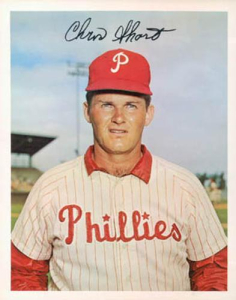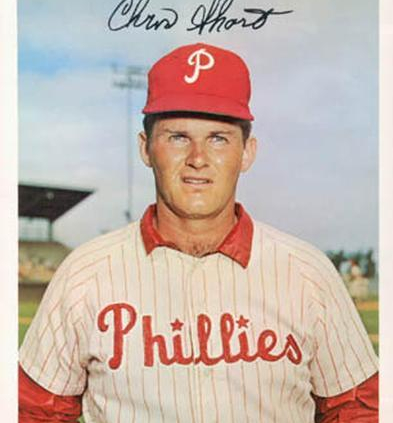October 2, 1965: Mets, Phillies play to an 18-inning scoreless tie
 The New York Mets and the Philadelphia Phillies were scheduled to close out the 1965 season with a three-game weekend series at Shea Stadium. The games had no impact on the National League standings. Philadelphia, 82-76, was in sixth place, 12 games behind the Los Angeles Dodgers, while New York was mired in the NL cellar for the fourth consecutive season with a 50-109 record.
The New York Mets and the Philadelphia Phillies were scheduled to close out the 1965 season with a three-game weekend series at Shea Stadium. The games had no impact on the National League standings. Philadelphia, 82-76, was in sixth place, 12 games behind the Los Angeles Dodgers, while New York was mired in the NL cellar for the fourth consecutive season with a 50-109 record.
After the first game of the series was rained out on Friday, October 1, a decision was made to play a twilight-night doubleheader on Saturday. Philadelphia won the first game, 6-0, behind Jim Bunning’s 10-strikeout two-hitter.1
At approximately 8:30 P.M., 30 minutes after the opener ended, the teams took the field again with 10,371 fans hoping to see the Mets split the doubleheader. Left-hander Rob Gardner was on the mound for the Mets, making his fourth start after being called up in September. The 20-year-old Gardner entered the game with a 6.92 ERA in 13 innings. He had lasted only three innings in the Mets’ loss to the Phillies on September 26.
The Phillies looked as though they might clobber Gardner in the first. Adolfo Phillips led off with a single and Cookie Rojas walked. Dick Allen’s fly ball to deep right moved them up. But Gardner struck out Dick Stuart and got Alex Johnson to fly out to left.
Left-hander Chris Short started for the Phillies. He entered with 18 wins and a 2.96 ERA. He was hoping to earn his first win against the Mets in 1965 after three previous starts had yielded a loss and two nine-inning no-decisions.
As with the Phillies against Gardner, New York looked as if it might get the best of Short in the first. Joe Christopher walked with one out. Charley Smith bunted safely down the third-base line. Jim Hickman flied to center with Christopher moving to third. But 21-year-old rookie Ron Swoboda was called out on strikes and was ejected for arguing about it.2
Two Mets errors put a Phillies runner on third base in the third inning, but Allen—whose 150 strikeouts in 1965 led the majors—fanned to end the threat. “I was almost out of the game,” remembered Gardner. “I thought, I’m not going to walk this guy. I just threw the ball as hard as I could and he swung through it. As I walked off the mound, he looked at me and just shook his head.”3
The Mets hit two doubles in the bottom of the third but failed to score. Ron Hunt doubled. Christopher followed with another double, but Hunt stopped at third. Short struck out Smith and Danny Napoleon to keep the game scoreless.
Both pitchers breezed through each frame. There were few baserunners. Allen singled in the sixth and Hickman doubled in the bottom of the inning, the only baserunners for either team from the fourth until the ninth. Hannah Kyser, in a 2020 story about the game, wrote, “The Phillies batters made it easy on Gardner, swinging at first pitches that turned into quick outs and kept his pitch count low.”4
The Mets had a chance to win the game and split the doubleheader when they got two baserunners in the ninth. With two out, Greg Goossen singled. September Triple-A call-up Cleon Jones hit a grounder to first and beat Short, who was late covering the base, for a single. But Short struck out Roy McMillan and the game went into extra innings.
Gardner returned to the mound in the 10th. He walked leadoff batter Tony González. Bobby Wine’s sacrifice moved him to second. A pair of groundouts stranded him there. Short retired the Mets in order in the bottom of the 10th. Allen singled in the 11th but Dick Stuart’s pop fly ended the frame.
Short gave up a single to Hickman in the 11th. Hickman stole second but got no farther when Jones flied out to center. Christopher led off the 13th with a single, but Smith grounded into a double play.
As the innings continued, Philadelphia considered pulling Short from the game. Gardner said later that he heard Short tell his manager, “I’m not coming out until that other son of a bitch comes out.”5
Gardner was sure he lost the game in the 14th when the powerful Allen hit a monster fly ball to dead center. Jones kept moving back until, standing on the warning track, up against the center-field fence, he caught the ball for the second out. Allen had rounded first and was halfway to second base when Jones made the catch. Gardner recalled years later that as Allen cut across the mound on his way back to the dugout, he looked at Gardner and just laughed.6
The Phillies had another chance to score in the 15th when González doubled. Gardner got out of the jam by getting the next two batters to fly out. The Mets put a runner on base in the bottom half of the inning when Hunt singled and stole second with two outs. But Short struck out Christopher to end the frame.
Gardner left the game after the 15th.7 He had yielded just five hits, walked two, and struck out seven. Short also left the game after the 15th after giving up nine hits and walking three batters.8
Darrell Sutherland relieved Gardner and Gary Wagner came in for Short. Both pitchers pitched two scoreless innings and both were helped when a runner was caught stealing for the third out.9 The Mets’ last baserunner was Bobby Klaus in the bottom of the 17th, but a failed bunt, a fly out and a strikeout left him on base.
Dennis Ribant took over for the Mets in the 18th and retired the Phillies in order. Jack Baldschun pitched the 18th for the Phillies and also retired the Mets one-two-three.
The 18th inning ended as the clock ticked toward the city’s 1:00 A.M. curfew. National League rules in 1965 also stated that an inning could not start after 1:00 A.M. The game was declared at an end after 4 hours and 39 minutes with the teams tied. The NL rules stated that the game would have to be played again. In this case, since there was only one day left in the season, both teams would need to play the game the next day.10
Short finished the season with an 18-11 record and a 2.82 ERA, second on the Phillies behind Bunning. He struck out 18 batters in the game, tying the major-league record for strikeouts in an extra-inning game.11 Warren Spahn of the Boston Braves had struck out 18 Chicago Cubs on June 14, 1952, and Cincinnati Reds right-hander Jim Maloney repeated the feat against Mets earlier in the season. Both teams lost the game despite their pitchers’ efforts.12
Gardner’s and Short’s efforts did not show up in their teams’ final records since the game ended in a tie.13 “That means that game never existed,” Gardner mused years later. “Disappointed, yes. Mad, no. That’s too far in the past to be mad about it. But I’m kind of sad, yeah. All for naught.”14
The game was not the longest to end in a 0-0 tie. On September 11, 1946, the Reds and Brooklyn Dodgers played a 19-inning scoreless tie at Ebbets Field before it was called because of darkness after 4 hours and 40 minutes.
Neither the Mets nor the Phillies were interested in playing two games the next day since they would have no impact on the final standings. The umpires’ crew chief, Frank Secory, called National League President Warren Giles and requested an exemption from the rule. Giles refused the request and both teams had to play a doubleheader the day after playing 27 innings of baseball.
The final-day doubleheader resulted in two Phillies wins by 3-1 scores. Philadelphia broke a tie in the opener with ninth-inning RBI doubles by Wine and winning pitcher Ray Culp; Al Jackson became a 20-game loser for the second time in four seasons with the Mets.
In the nightcap, New York’s Jack Fisher, who had lost his spot in the Mets rotation when Gardner was called up, went 13 innings but took New York’s 112th loss of the season. Billy Sorrell led off the top of the 13th with his first major-league home run to break the tie. Rookie right-hander Fergie Jenkins picked up the win with two scoreless innings in his seventh big-league appearance.15 “All told, the teams played almost 49 innings of baseball in those final two days of the 1965 season,” Mark Varvaro observed in a 2018 article.16
Acknowledgments
This article was fact-checked by Bruce Slutsky and copy-edited by Len Levin.
Sources
In addition to the sources cited in the Notes, the author used the Baseball-Reference.com and Retrosheet.org websites for box-score, player, team, and season pages, pitching and batting logs, and other pertinent material.
https://www.baseball-reference.com/boxes/NYN/NYN196510022.shtml
https://www.retrosheet.org/boxesetc/1965/B10022NYN1965.htm
Notes
1 It was Bunning’s 19th win of 1965. From 1962 through 1966, the left-hander won exactly 19 games four times in five seasons.
2 Swoboda led the team with 19 home runs and was second in runs scored with 52 in 1965 so his loss may have hurt the Mets’ chances of winning the game with just one swing of the bat.
3 William J. Ryczek, The Amazin’ Mets 1962-1969 (Jefferson, North Carolina: McFarland, 2007), 115.
4 Hannah Keyser, “You’ve Probably Never Heard the Story of the Best Pitching Performance in Mets History,” Yahoo Sports.com, April 21, 2020. https://sports.yahoo.com/youve-probably-never-heard-the-story-of-the-best-pitching-performance-in-mets-history-184309965.html.
5 Keyser. Short pitched longer than nine innings only four times during his 15-season career.
6 Keyser.
7 Gardner is tied with Al Jackson for the longest single-game pitching stint in Mets franchise history.
8 Short and Gardner share the Shea Stadium record for the most innings pitched in a game.
9 Pinch hitter Johnny Lewis, who was on first after being hit by a pitch, was caught stealing in the bottom of the 16th. Gonzalez was caught stealing for the third out in the top of the 17th inning.
10 The National League rule was the result of cities having curfews for a variety of reasons. In New York City the curfew was designed to prevent the sale of alcohol after midnight.
11 Short finished the season with 237 strikeouts, a Phillies record.
12 Spahn pitched 15 innings, giving up two runs in the 15th inning in the 3-1 loss to the Cubs on June 14, 1952. Maloney pitched 11 innings before giving up a run to the Mets in the 11th for a 1-0 loss on June 14, 1965.
13 Although the games did not count in the team records, the players’ statistics did count.
14 Kyser.
15 Philadelphia’s Grant Jackson pitched nine innings in his second major-league start but received a no-decision.
16 Mark Varvaro, “Remembering the Best Start in Mets History,” AmazinAvenue.com, March 28, 2018, https://www.amazinavenue.com/2018/3/28/17161076/new-york-mets-best-start-rob-gardner-pitcher.
Additional Stats
New York Mets 0
Philadelphia Phillies 0
18 innings
Game 2, DH
Shea Stadium
New York, NY
Box Score + PBP:
Corrections? Additions?
If you can help us improve this game story, contact us.


